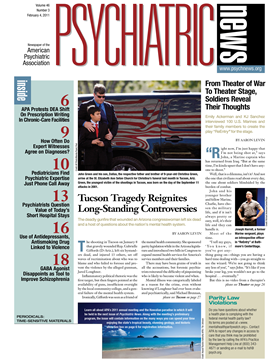In an article in the February Psychiatric Services, authors Ira Glick, M.D., Steven Sharfstein, M.D., and Harold Schwartz, M.D., offer a model for psychiatric hospitalization that proceeds in three stages—assessment, implementation, and resolution.
•
The Assessment Phase: This is a time to observe, gather information, and formulate a plan prior to active treatment, and ideally it should occur prior to actual admission. Old and current medical records should be obtained, and contact should be made with treatment providers and the patient's significant others. A thorough history, a plan for proposed treatments, a sense of what is achievable, and likely prognosis are goals for the assessment phase.
•
The Implementation Phase: This is the core of the inpatient stay and should accomplish more than merely ensuring safety during a crisis. The crucial objective is to further define the issues that led to the hospitalization and implement interventions that change the illness trajectory. Objectives are to treat the current episode and put measures in place that will prevent subsequent episodes.
•
The Resolution Phase: Here the goal is to consolidate the gains made during the implementation phase and ensure effective continuing treatment in day programs, intensive outpatient alternatives, and residential and community settings. Patients (and family members) will be adjusting to the changes produced by the interventions made during the implementation phase and will need continuing support to understand, tolerate, and adhere to them. Better transitions are more consistent with the goals of recovery and are ultimately more cost-effective.
“Traditionally we have assumed that anyone ill enough to require hospitalization needs a careful assessment,” said Schwartz. “That requires a certain amount of time, and people who come in with severe psychiatric disorders compounded by use of substances need time to have those substances washed out. Others who come in on multiple medications need to have a reasonable period in which they can be assessed without medication.
“The things we propose are not revolutionary or radical,” Schwartz told Psychiatric News. “When medications are introduced, they ought to be introduced one at a time. But we live in an age of polypharmacy, and the evidence base for polypharmacy is conflicting. The current practice in ultrashort stays is not driven by evidence at all, but by the time limitations we have to work with.”
More generally, Schwartz lamented the black-and-white dichotomy of debates with community advocates in which treatment in the community is “good” and the hospital is “bad.”
“We are talking about a continuum in which ultimately the hospital will play a small role in the life of the patient, and outpatient care will play a large and continuing role,” he said. “But the inpatient piece has been whittled down by payers determined to reduce costs to the absolute minimum, and in doing that, we have sacrificed important clinical values.”

